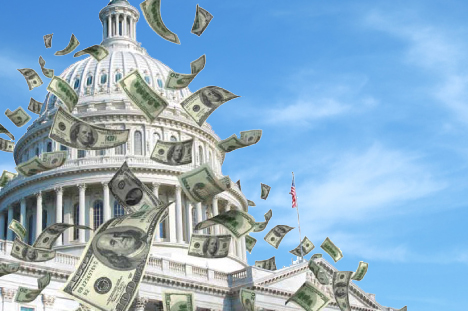As was pointed out in part 1, spending money on the spread of ideas is not a problem as long as force is not being used to promote or restrict them. On the other hand, using money to obtain some quid-pro-quo is potentially an issue, but likely not for the reason usually given. I include in this category not only spending on elections but also lobbying in general. The belief that such spending can change the nature of legislation that is passed is to say in essence that votes are available to be bought and sold. This should naturally lead to the questions of Who is selling what? To whom?, and Why are they being bought?
Not surprisingly, most of the attention in the media and from politicians is placed on who is buying, r attempting to buy. Depending on your source, you will hear of the Koch brothers, George Soros, labor unions, various corporations, and countless other parties who are attempting to use money or influence to “rig the game” in their favor. You almost never hear about those who are on the selling side of the trade: elected officials. The fact is that the sellers, the politicians, are the key element without which all the money in the world would be useless to affect laws.
[PB – The day I posted part 1, SCOTUS struck down as unconstitutional the limits on aggregate donation for political campaigns. This brought the usual howls from the left as to how terrible this decision is and how the wealthy will corrupt the system. As Senator Harry Reid tweeted, “Today’s Supreme Court ruling gives even more power to the wealthiest few who are trying to buy our democracy, like the Koch Brothers.” Predictably there was no mention as to who the Koch brothers are buying democracy from, which would seem to be a logical question.]
The “what” these politicians are selling is government intervention, especially intervention into the economy. Although in a true capitalist system the government would be limited to solely protecting the rights of individuals, in a mixed system such as in the United States today the government controls and regulates virtually all aspects of the economy. Government regulations dictate how much a business must pay its workers, with whom they can negotiate, what processes they can use to manufacture their product, under what conditions they can sell those products, to whom they can sell them, with whom they cannot refuse to do business, where they can build their factory, and on and on, in many cases to the tiniest detail. Such interventions can easily make or break a business.
In a mixed system, the “why” people would buy votes becomes nearly self-evident. When a small number of people wield the power to add or change such regulations, is it any wonder that those with the most to gain, or lose, would seek to influence those changes in their favor and/or hinder their rivals? After all, it is much easier to convince a majority of 535 federal legislators to change a law in your favor than it is to convince millions of consumers to buy your product.
This natural attraction of the wealthy to the center of power is further aggravated in the United States by the changing view of economic rights, for example property rights and rights of contract and association. Early in American history, these rights were considered equally with such rights as freedoms of religion and speech. Any infringement of these rights by the government required that the government prove there was a compelling need to infringe them and that it was being done in the least intrusive way. As I have written about before, in the last 100 years, especially since the 1930s and the New Deal, even this thin protection has disappeared. The Courts have increasingly deferred to legislatures on economic matters, assuming that when a law is passed regulating the economy the legislature knew both that what they were doing would be effective and that it was constitutional. In economic cases, those affected by the legislation could not expect the Court to overturn it. As one justice put it, “if you do not like an economic legislation, go to the legislature and change it.” In such circumstances, with no other option when their legitimate rights are being infringed, can businesses or the wealthy be blamed for doing just what the Courts have told them to do?
Therefore, the solution to the “problem” of money in politics is not restrict the amount of money used to spread ideas, campaign donations and spending, but rather to restrict the government to its proper role of protecting individual rights. Their sole function should be to protect individuals against criminals of all sorts, to protect the country from invasion or other external threats, and to provide courts to adjudicate disputes under objective laws. In such a system, a true capitalist system, the government would have no favors to sell to anyone, regardless of the price. Business would not be sacrificed for the “public good” nor would the individual be sacrificed to business, both of which happen all to commonly today.


Pingback: Cronyism, Corruption & Government Power-Order From Chaos
Pingback: Money in Politics, Part 1 - The Spread of Ideas - Order From Chaos
cool! we’re recommending your work on #theneeds #Politics! See http://t.co/EvqedaIbLm & RT to boost it!
hey! we’ve featured your work on #theneeds #Politics! Visit http://t.co/VKfjpEafiH & RT to spread the word!